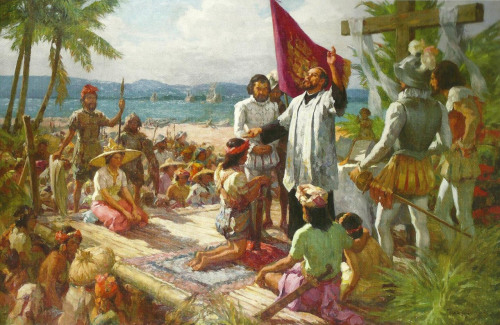Five hundred years ago was still a time of colonization in the world and the time when the Spanish colonizers discovered, conquered and brought the Christian faith in most areas of the Archipelago that they named “Philippines.” Our reflection here is focused on the challenge to make the event of the 500 years celebration a good occasion to reaffirm the importance of dialogue among peoples of different cultures and religions in the Philippines.

The history of all religions, including Christianity and Islam, the two biggest religions of the country, has been always along the years a history of great and good stories, but also of dark times and conflicts. We are called to appreciate the good stories and to recognize also some dark pages of history.
Guided by this spirit we reaffirm here the importance to respect and love all peoples guided by the best practices of our own religion as an opportunity to internalize and share the mercy and compassion of God. Thus, we are called today not to judge history, but to learn lessons from history.
The Christians are invited to internalize the message of mercy and compassion of God that became visible in its higher level in Jesus Christ, the Emmanuel, God among us, who shared His love for all up to the cross and resurrection. The Christians know that some religions, including Islam, do not believe in all parts of the Christian faith, in the same way the Christians do not understand some beliefs of the Muslim faith or the faith of other religions, but all of us have to approach other religions with respect. Thus, interreligious dialogue becomes more challenging when it reaches the level of respect of the differences.
To be aware of the differences among religions and, in the process, to invite all to move to a common ground requires a deeper dialogue that is sustained by a spiritual journey. This attitude helps us to discover how close we are in the common aspiration of life, although we are far in some basic points of our faiths.
The 500 years of Christianity in the Philippines can be a good challenge to start a new page in the history of the Philippines and become a model for other countries. This can be possible if those who use the strategy of the conflict to divide us will surrender their vested interests to give space to the real needs of the people. We are part of the same “Human Fraternity”, as Pope Francis and the Grand Imam of Al- Azhar University, Ahmad Al Tayyeb reminded us on February 4, 2019 in the document signed together: “On Human Fraternity for World Peace and Living Together.” In this document it is emphasized: “the Culture of Dialogue as the path; mutual cooperation as the code of conduct; reciprocal understanding as the method and standard.”
We believe that in the 500 years of Christianity in the Philippines Christians are called to reaffirm their faith and to promote a deeper Christian life. Usually the Muslims appreciate the life of a real Christian who is a promoter of “love” in the spirit of dialogue and peace, as well as the Christians appreciate the life of a real Muslim who is a real model of “mercy and compassion.” Thus, we hope that the Christians in the Philippines in this time of preparation to the 500 years of Christianity in the country give more attention to the mission of Christianity as a mission of love for all. For this reason, we encourage all Christians to celebrate the 500 years of Christianity as a time of reconciliation, asking forgiveness for the mistakes of the past as an important step to build a sincere dialogue. This is what we wish to happen starting from those who have greater responsibilities in all sectors of society, especially the religious leaders: Muslims and Christians. We hope that they will be in the front line in building the Culture of Dialogue with God, with the self, with others and with creation.
In preparation of the 500 years celebration that will be in the year 2021, the Catholic Church in the last years have prepared us in many ways. For instance, this year 2019 is the year of the youth and the following year, 2020, will be the year of Interreligious Dialogue, Ecumenism and the Indigenous Peoples formation and activities. This will be a time when we are invited to ask forgiveness for the sins committed by the people who belong to our religions and put a past to all forms of violence and together, take care of those most in need and work together to save the earth, our common home. We hope that the 500 years of Christianity in the Philippines will find all of us united in the same aspiration of peace.

